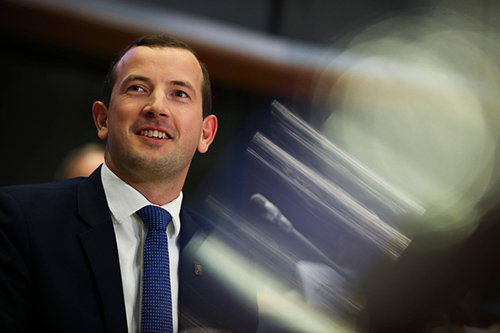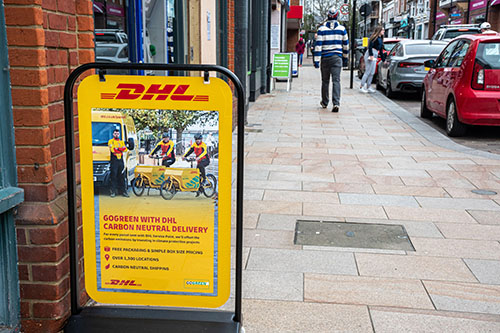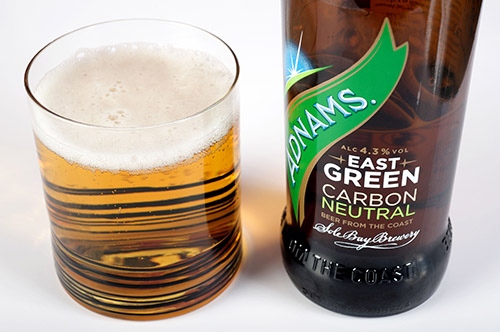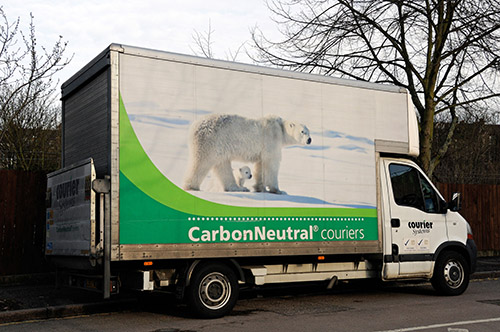Think of your next mid-morning snack. Segments of CO2-neutral clementine gently placed in a 70 per cent recycled plastic container that has been rinsed with an ocean-friendly detergent.
At present, European consumers who wish to be environmentally responsible must take a company’s word for it when it comes to claims about a product’s CO2 impact, recyclability, and ocean friendliness.
Now, the European Union wants to regulate the way such sustainability pledges are declared by making it mandatory for businesses to substantiate and certify these claims prior to publicising them.
“If you buy a water bottle, it is easy to say whether it is half empty or half full. But it becomes more complicated [if you want to] determine whether it was sourced in an environmentally friendly way or not,” says Virginijus Sinkevičius, European commissioner for the environment and lead on the file aimed at tackling so-called greenwashing.
“We want to make sure that if you pay for a green label, you get what you pay for,” he tells The Parliament.
Today, the vast majority of statements claiming that a product or service has net-zero emissions, or is carbon-neutral, CO2-compensated, ocean-friendly or bee-friendly, are not fully based in fact.
A 2020 impact assessment carried out by the European Commission, the European Union’s executive arm, found that 53.3 per cent of the examined marketing statements were vague, misleading or unfounded, both in adverts and on the product’s labelling. The study found that a staggering 40 per cent were “unsubstantiated”.
The aim of the new green claims directive is to clamp down on greenwashing practices, where products and processes are made to appear more environmentally friendly than they truly are.
If the new rulebook on environmental claims put forward at the end of March by the Commission makes its way through the legislative process, national legislators will have to apply the requirements within 24 months of its entry into force. As a result, corporates will have their green labels checked by external experts.
These third-party auditors will have to assess whether claims are supported by reliable and verifiable information before giving them the go-ahead for marketing within the EU’s single market. Green claims will only be allowed with science-based evidence supporting them.
 Virginijus Sinkevičius, European commissioner for the environment | Picture: Alamy
Virginijus Sinkevičius, European commissioner for the environment | Picture: Alamy
The new rules will also be applicable to companies based outside the EU wanting to sell their products in the bloc, with national market surveillance authorities responsible for enforcing the new measures.
The new directive is part of the broader Green Deal strategy, the bloc’s effort to become climate neutral by 2050. Together with new rules on the right to repair goods and to combat built-in obsolescence, it constitutes the third package of measures implementing a 2020 action plan aimed at pushing the EU towards becoming a circular economy.
Previous initiatives include an EU strategy for sustainable textiles, and a set of norms on packaging and packaging waste.
A parallel proposal on empowering consumers in the green transition, which was backed by the European Parliament in May and is about to enter interinstitutional talks, complements the green claims directive.
It bans misleading adverts and generic environmental claims, as well as (in the parliamentary negotiating draft) prohibiting statements solely based on offsetting schemes, a contentious point when it comes to the new crackdown.
In the Commission’s view, by identifying minimum requirements across the bloc, the green claims rules will help establish a level playing field when it comes to information about the environmental performance of products.
Activists and environmental NGOs, however, complain that the draft legislation has been watered down in comparison to previous internal versions, and lacks the teeth needed to trigger a real shift by creating an EU-wide standard for sustainable products.
“We want to make sure that if you pay for a green label, you get what you pay for”
But Sinkevičius remains positive. “We want to give power back to consumers and to create equal opportunities for businesses, while avoiding confusion on the market,” he tells The Parliament.
“With around 230 labels on the EU market which vary in robustness and reliability, it is hard for consumers to know what is true and what is not. We want to help everyone make informed purchasing choices.”
The commissioner says he does not expect the new anti-greenwashing rules to have any adverse pricing effects for customers, despite the fact the firms will have to bear the costs of certifications.
By bringing more accountability to the market, Sinkevičius says the initiative is expected to “reward those companies making a genuine effort to green their practices along their value chain and reduce their impact on nature, resource use, climate emissions or pollution”.
Delayed several times due to disagreements on key features amid what civil society groups describe as heavy-hitting lobbying by industry representatives, the draft legislation could be a gamechanger for consumer transparency and protection, and a major compliance cost for businesses.
BEUC, the European Consumers’ Organisation, believes it represents a promising major step forward for shoppers’ protection: “Preventing the problem [of greenwashing] instead of correcting it once the harm is done is an innovative move which will benefit consumers, who want to act sustainably and need reliable information to do so,” a statement from the association reads.
 Firms have moved to press their green credentials in recent years | Picture: Alamy
Firms have moved to press their green credentials in recent years | Picture: Alamy
Dimitri Vergne, the sustainability lead at BEUC, tells The Parliament: “This mechanism acts as an ‘ex-ante’ filter before the claim is made. One of its main potential benefits is [around] disclosing obligations, with companies required to make the evidence backing their environmental credentials available online and in a QR code accompanying the product.”
He adds: “We hope this could act as a deterrent for companies not to engage in greenwashing and could facilitate our work in the enforcement of consumer protection legislation.”
The new draft legislation, the Commission explains in a press release, paves the way for “qualified entities” such as non-governmental bodies or organisations promoting human health, environmental or consumer protection to bring class actions if businesses make implicitly or explicitly unsubstantiated green claims.
Vergne welcomes this : “As long-term advocates supporting collective redress, this is an additional enforcement tool that we will certainly consider in our fight.”.
Describing climate diplomacy as one of the key pillars of the EU’s green efforts, Sinkevičius adds that “by setting strict and clear rules for environmental claims within the EU, the Commission aims to set a high standard for business globally”.
Of course, the EU is not alone in its anti-greenwashing crusade. In 2021, the UK’s Competition and Markets Authority launched a sector-by-sector review of misleading environmental claims, both online and in-store.
It started with fashion, calling out some fast-fashion brands for their practices and opening an enforcement action against them, while later expanding the investigation to food, drink, toiletries and cleaning products.
The US Federal Trade Commission followed suit, and is reviewing its ‘Guides for the Use of Environmental Claims’ for the first time in more than a decade.
In the current version of the EU’s draft rulebook, companies found to have made misleading claims would face financial and economic repercussions.
“This initiative is not detailed enough to succeed in its intentions”
The draft law requires EU countries to impose financial penalties of up to at least four per cent of a company’s annual turnover in the concerned Member State(s), as well as the possibility of confiscation of revenues gained from the non-complaint activity, and even a temporary exclusion of up to 12 months from public procurement and access to public funding.
The new proposal does not set out a methodology to verify green claims. Instead, it says any claims need to be substantiated in accordance with a minimum set of criteria and independently verified by an accredited verifier in advance.
This is where the shoe pinches, according to non-governmental actors, who say the EU Executive should have provided clear guidance for the independent verification process.
“Don’t get me wrong, [the directive] creates a framework to fight greenwashing, which is already a positive development,” Margaux Le Gallou, programme manager at the international NGO Environmental Coalition on Standards, tells The Parliament, pointing out that no such framework previously existed.
But, she says: “this initiative is not detailed enough to succeed in its intentions. It lacks the technical profiles to crack down on [greenwashing claims], leaving many aspects in a grey zone, and ultimately failing to create harmonised methodologies to calculate the environmental impact at EU level.”
For Le Gallou, a leading voice in the field of environmental marketing standards in Brussels, the directive instead opens the door to 27 different systems, which will produce non-comparable results and complicate the task of national market surveillance authorities.
“What we had been advocating for was something like what is in place for health claims, where you must go through an authorisation procedure at the EU level [overseen by] a dedicated EU agency.”
But according to Sinkevičius, the Commission deliberately did not set out a methodology to verify green claims. “We do not intend to create a single standard, but want to encourage private schemes, leaving it to the market to develop them based on the parameters which are found to be most relevant.”
Le Gallou argues that the lack of guidance and the opaque and undemocratic way in which methodologies will be developed by private players creates the risk that the rules will be too vague to have an impact.
 New rules are aimed at giving power back to consumers and avoid confusion on the market | Picture: Alamy
New rules are aimed at giving power back to consumers and avoid confusion on the market | Picture: Alamy
At the same time, she warns, they also increase the likelihood that companies will “forum shop”, or “choose to have their label validated in some countries rather than in others” for more favourable treatments, “cherry-picking methods showing the most promising marketing results”.
Le Gallou says: “As we have understood it so far, verifiers will likely be private firms already providing consulting services to the industry. But how trained will their employees be for this new task, and what resources will they have?”
The EU’s Executive has clarified it will complement the requirements on substantiation for claims at a later stage, likely with delegated and/or implementing acts.
There is another elephant in the room which weakens the legislative effort, according to critics of the new proposal. While calling on “companies to focus on reducing emissions in their own organisation or value chain” and “to be transparent about what part of their operations” relies on offsetting, the Commission has not gone so far as to ban claims relying on carbon offsetting, which is something the European Parliament has targeted in another draft legislation of the circular economy package.
Offsetting occurs when a polluting company buys a carbon credit to make up for the greenhouse gas it has emitted, and the money is used to fund actions, such as planting trees, to remove the same or a similar amount of carbon out of the air, or to prevent carbon emissions.
Carbon offsetting is paradoxical, Le Gallou argues: “It is like saying cigarettes kill people and then, as a remedy, investing in birth policies to have more babies. Why does this sound absurd in health policy but considered acceptable for the environment? There is no scientific reality behind CO2 offsetting.”
 Companies found to have made misleading claims would face financial and economic repercussions | Picture: Alamy
Companies found to have made misleading claims would face financial and economic repercussions | Picture: Alamy
Furthermore, she adds, “evidence shows the majority of such trees are either not being planted, are not additional to what would have been planted anyway, or burn because of the consequences of climate change”.
The Commission’s text stipulates that sharing information on carbon compensation and, separately, on actual greenhouse gas emissions with customers in a transparent way is going to be just enough to abide by the new framework.
“Climate neutrality claims are not prohibited by the directive, even though they are a form of greenwashing, and there is ample evidence they hamper the ecological transition,” Le Gallou insists.
BEUC’s Vergne agrees: “We want all carbon-neutral claims, like those frequently made by airlines, to be prohibited, because from a scientific point of view this is never true.”
Campaigners look at governments and Members of the European Parliament to improve the text, including mirroring the outright ban of green labels based on offsetting schemes.
Following the adoption by the College of Commissioners in March, now it is a matter for consideration by the European Parliament and the Council of the EU, and then for interinstitutional negotiations between the two co-legislators.
While countries have not yet officially voiced their opposition to these provisions, many, including inside the Berlaymont headquarters, fear the plan may be hamstrung because of some governments’ hostility and a general mounting hesitation towards symbolic green measures ahead of the EU elections which will take place on 6-9 June next year.
For civil society groups, time is of the essence to get the green claims directive over the finishing line before spring 2024.
Having the crackdown on greenwashing agreed “by the end of the mandate” is an objective shared by commissioner Sinkevičius. He tells The Parliament that “there is still time to agree on a solid proposal, which was very much awaited by the European Parliament”.
Sinkevičius is well aware that Green Deal files are not having an easy life in the Council these days, at a time of political pushbacks from within some governments against legislative dossiers like the energy performance of buildings or the ban on fossil-fuelled cars and vans.
Yet he remains hopeful: “You know, it’s almost the end of the mandate… But I can tell you there has not been so far any specific opposition to our green claims proposal.”
Sign up to The Parliament's weekly newsletter
Every Friday our editorial team goes behind the headlines to offer insight and analysis on the key stories driving the EU agenda. Subscribe for free here.